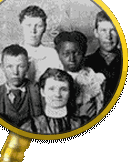-
Bring the topic into present day. Ask students what they would do if they were drafted into a war. Would they serve in the military or would they become a conscientious objector? What are their personal beliefs that support their position?
-
Students could continue research on other conscientious objectors. This lesson did not include a specific example of non-combatant military conscientious objector. Explore the fascinating stories of Lew Ayres at PBS: THE GOOD WAR And Those Who Refused To Fight It or Desmond Doss, the first conscientious objector to receive the Congressional Medal of Honor. Or students may find the diary of a conscientious objector who participated in a famine experiment interesting to read at the PBS site.
-
Have students research the history of the United Nations. When was it started? Why did it begin? What is its purpose? What countries are in it? How does its" policies affect United States" policies? As part of their research students can look at the United Nations Charter and its Preamble.
-
Conscientious objection is an example that opens up a lot of important civic and government questions: What is the civic duty of an individual to his country? What role does the government have to protect individual rights? When can the government curtail those rights? Explore these questions further by looking at different forms of government. How do other countries" handle conscientious objection? Compare other countries" policies (or lack thereof) to the United States".
-
Bayard Rustin was one of the conscientious objectors studied in this lesson. Students can learn more about Rustin exploring Gandhi's influential philosophy of non-violence and how it was used during the Civil Rights movement.
-
Discuss this poem:
"Conscientious Objector" by Edna St. Vincent Millay I shall die, but that is all that I shall do for Death. I hear him leading his horse out of the stall; I hear the clatter on the barn-floor. He is in haste; he has business in Cuba, business in the Balkans, many calls to make this morning. But I will not hold the bridle while he cinches the girth. And he may mount by himself: I will not give him a leg up. Though he flick my shoulders with his whip, I will not tell him which way the fox ran. With his hoof on my breast, I will not tell him where the black boy hides in the swamp. I shall die, but that is all that I shall do for Death; I am not on his pay-roll. I will not tell him the whereabouts of my friends nor of my enemies either. Though he promise me much, I will not map him the route to any man's door. Am I a spy in the land of the living, that I should deliver men to Death? Brother, the passwords and the plans of our city are safe with me; never through me Shall you be overcome.
Haverford College Quaker and Special Collections Haverford College 370 Lancaster Avenue Haverford, Pennsylvania, 19041-1392 (610) 896-1161
If students are interested in studying more about Quakerism arrange a visit to Haverford College Quaker collections, considered one of the world's finest repositories on this subject.
National Constitutional Center 525 Arch Street Independence Mall Philadelphia, PA 19106 (215) 409-6600
To explore more about our nation's Constitution and the freedoms that protected therein, plan a visit to the National Constitution. Check out the first amendment and discover its relevancy to this lesson. Then enjoy the interactive and multimedia exhibits designed to further understanding of this amazing document and our nation's government. The center's website provides well-developed resources for both teachers and students–as well as information and materials needed to plan a field trip.
Pennsbury Manor 400 Pennsbury Memorial Road Morrisville, PA 19067 (215) 946-0400
This manor was the home of William Penn, the Quaker who founded Pennsylvania as "a religious experiment." Visit this historic site to understand more about the life of William Penn and how he lived
Swarthmore College Peace Collection 500 College Avenue Swarthmore, PA, 19081-1399 (610) 328-855
This collection was first established around the 1930s when Jane Addam's famous Hull House donated its books and papers about peace and social justice to Swarthmore College. Among materials on women and peace, nonviolence, feminism, civil rights, civil disobedience, and social reform movements is a collection of excellent material and database information on conscientious objectors. With advance notice, perhaps the curator could exhibit some of exciting materials they have on this subject.




